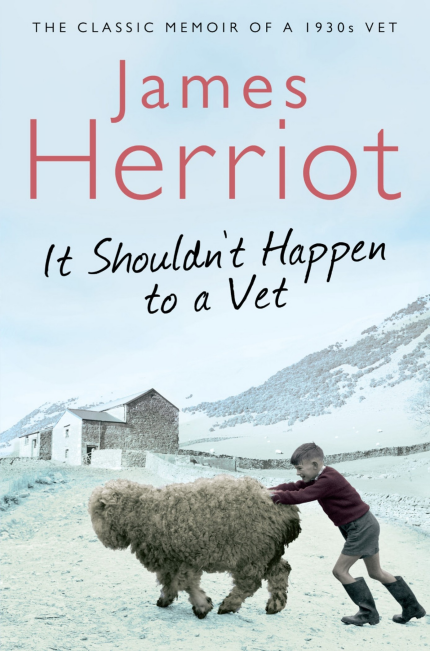It Shouldn’t Happen to a Vet (All Creatures Great and Small #2), by James Herriot

It Shouldn’t Happen to a Vet: The Classic Memoir of a 1930s Vet by James Herriot
My rating: 5 of 5 stars
This is pure “comfort food” for me: James Herriot’s memoirs are like a soothing, nurturing balm for the soul for me.
Nestled within the pages of this book is not only the continuation of the endearing sagas I came to love from his previous work but also a wealth of humour, warmth, and genuine affection for both animals and humanity.
»It was to a moribund horse, and Mr. Sidlow, describing the treatment to date, announced that he had been pushing raw onions up the horse’s rectum; he couldn’t understand why it was so uneasy on its legs. Siegfried had pointed out that if he were to insert a raw onion in Mr. Sidlow’s rectum, he, Mr. Sidlow, would undoubtedly be uneasy on his legs.«
What strikes me most about Herriot’s writing is the effortlessly vivid way he captures the life of a country vet in Yorkshire. His narrative weaves intricate tales that both amuse and move, with a cast of characters that could only belong to the unique world he describes. From farmers set in their ways to a range of animals that bring to life the breathtaking canvas of the Yorkshire dales, Herriot’s storytelling paints a picture so compelling it’s as if the drystone walls and rolling hills leap from the pages.
The anecdotes shared within the book seem almost too extraordinary to be true, yet it’s the authenticity of Herriot’s experiences that infuses his writing with such heartwarming appeal. Whether he’s recounting midnight emergencies or the quirks and foibles of his four-legged patients, one can’t help but be enchanted by the compassionate interplay between man and beast.
»Yet what made him trail down that hillside every day in all weathers? Why had he filled the last years of those two old horses with peace and beauty? Why had he given them a final ease and comfort which he had withheld from himself?
It could only be love.«
Part of the book’s allure also comes from Herriot’s narrative tone, which is at once entirely self-deprecating and brimming with a gentle humour. He portrays his younger self with such candour, reflecting on the trials and tribulations of a novice vet that his experiences become wonderfully, and hilariously, relatable. The moments of exasperation, the triumphs over seemingly insurmountable challenges, and the lessons learned in the most unexpected of ways have a way of resonating with anyone who’s ever pursued a passion or followed a calling.
»A backhander on the side of the head drove me violently against Helen’s shoulder and I was beginning to apologise when I saw that her twitching and frowning had come on again. But this time it spread and her whole face seemed to break up. She began to laugh, silently and helplessly.
I had never seen a girl laugh like this. It was as though it was something she had wanted to do for a long time. She abandoned herself utterly to it, lying back with her head on the back of the seat, legs stretched out in front of her, arms dangling by her side. She took her time and waited until she had got it all out of her system before she turned to me.
She put her hand on my arm. “Look,” she said faintly. “Next time, why don’t we just go for a walk?”«
While the humour is a constant thread — with escapades often leading to side-splitting laughter — there is a profound sense of respect that Herriot extends towards his profession. His depiction of the intimate relationship between humans and their animal companions serves as a tender reminder of the trust and responsibility placed in the hands of those who care for our non-human friends.
»I tried to be cheerful. “Well, I don’t think she’ll die, and even if the quarter goes she’ll make it up on the other three.” But there was the feeling of helplessness I always had when I could do little about something which mattered a great deal.«
Yet, it’s not merely the insightful look into veterinary life that captivated me, but also the rich portrayal of rural England in the 1930s. The social history wrapped within the book’s humourous anecdotes paints an evocative image of the period. We’re given a snapshot of a world that teeters on the threshold of change, and through Herriot’s eyes, we can witness the shifts in society that herald the modern era whilst clinging to the timeless traditions that define Yorkshire and its people.
»But the effort fell flat; the effect was entirely spoiled. He was polishing the glass with a dead hen.«
In short, ‘It Shouldn’t Happen to a Vet’ is a splendid read that I would wholeheartedly recommend to anyone with a love for animals or a fondness for the English countryside and its stories. Herriot’s well-told stories are soaked in warmth, wisdom, and a touch of good old-fashioned humanity.
I love them deeply. Five out of five stars.
Also: »nincompoop« – how not to love that?!
Ceterum censeo Putin esse delendam
View all my reviews